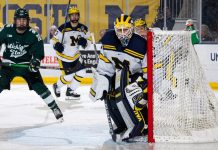It took the 2010-11 Colgate Raiders nearly three months — 11 games — to get their first two league points. Those points were the result of two ties, 77 days apart, the latter coming on Jan. 21 against Cornell.
The Raiders didn’t earn their first league win for another two weeks, on Feb. 5 against Clarkson … the team they tied in their conference opener, way back on Nov. 5.
This year’s team has been a tad more successful.
The No. 18 Raiders are 5-3-1, ranked for the fourth straight week, and already have their first win in ECAC Hockey action following a 5-3 victory at Brown on Friday night. (Last year’s squad didn’t win a conference road game until Feb. 11.) Colgate has already defeated a talented Nebraska-Omaha team on the road and split with annual contender Miami at home.
One of the biggest indicators of change so far is that Saturday’s 2-0 loss at champion Yale was seen as a setback, rather than an inevitability. Expectations are high in Hamilton this year. The team’s attitude is building toward that bar.
“Obviously coming off of last year, there were still some question marks even though we finished strong,” said 19-year coach Don Vaughan. “We still thought there were some lingering effects of a difficult regular season, but I think we put that behind us pretty quickly. I think our energy has been good, we’re getting real solid goaltending, and our power play has been — not exceptional, but much better than last year. Pretty good. Those are things that I see right away here have been a real plus for us.”
Vaughan cited the returning roster’s offseason trip to Italy and Switzerland as the perfect segue between seasons. Part sightseeing vacation, part practice and game action, the tour was all team-building.
“Our trip to Europe had a real positive influence on the team; I don’t think that could’ve come at a better time. We had a chance to bond, to talk about last season, and start looking forward and work on some line combinations and special teams play,” Vaughan said. “We really had a great experience, both on the ice and off, and I think that set the tone for a real positive mind-set coming back.”
It was an especially significant experience for the Raiders’ seniors. Nine men strong, the team’s largest class is finally stepping out into a spotlight all its own, and is excelling in the leading role.
“You know, it’s interesting, because the senior class is a big class, and as they’ve come through the program — even though they were big in numbers — there were some pretty talented and strong personalities ahead of them,” Vaughan said. “It was really interesting to see, because we were wondering what kind of impact that big class would have on the program, having not had a real strong sort of influence in the locker room [until this season]. It’s been kind of fun: they’ve taken the challenge of putting their own stamp on it, there are some characters in the group … and I think that the younger guys have looked up to them.
“The biggest thing is that even though there are some characters there, they’ve come to the rink every day with a real serious work ethic. They’re leading the way in all the drills. That’s been really fun for me to see, since every team changes, whether you graduate three like last year or nine as we will this year; the chemistry and the makeup of your team changes. It’s always a little bit of a wait-and-see attitude, but I really like the way this senior class has really put their stamp on this season early on and has brought the younger guys along with them.”
While a star like Austin Smith naturally will draw the most attention of anyone in his class, Vaughan says that senior forward Matt Firman exemplifies what quality leadership is all about.
“Matt doesn’t say much,” Vaughan said. “He’s got a handful of eight or nine guys that are close to him and that really look up to him. He’s a quiet guy, a big guy — got a big presence — and he just comes to the rink every day and works hard. He’s a great citizen off the ice. He’s a premed major — so he’s got a tremendous workload academically — but here he is, every day, that is one of those guys who’s at the rink early, he’s at the top of the line in all the drills at the weight room or at the rink. I think that the younger guys have kind of latched on to him because he carries himself that way.”
That said, Smith is no paper tiger. The top overall goal-scorer in the league so far (nine in nine games) channeled his frustration from last year into a most productive pursuit: kicking butt this year.
“Austin came in with a real great attitude after last year. I think he was disappointed with his own season, but clearly with the way things went for us during the regular part of the season [as well],” Vaughan said. “I think in fairness to him, he was coming off major hip surgery, the rehab for which was probably a little bit accelerated from what we would have ideally liked, so he probably was not where he needed to be or should’ve been last year to start the season, and that set him back. He had surgery again this year at the end of last season, but he had a longer time to recover and he was ready to go by the trip to Europe.
“He came in very determined; it all starts between the ears. He talked about it at the end of last year, he worked hard over the summer to get back in top condition, and he wants to be the go-to guy. I give him full marks for that. He’s taken it as a direct challenge to himself, and so far he’s been able to do it. His energy level’s been incredible, he’s hounding the puck like he’s never done before, and the bonus is that he’s finishing on some great opportunities. He’s got big goals for us so far. He’s a great player. He’s dynamic. He’s one of the smartest players I’ve ever coached. He sees the ice in a different way. … He can really analyze a game at full speed better than most.”
Vaughan and the rest of the Raiders realize that they shouldn’t take Smith’s current pace for granted, and that they can’t expect to be successful with one player accounting for roughly a third of the team’s scoring. Colgate has 28 total goals this year.
“It’s something that we’re not going to hide from,” he said. “We’ve talked about it and we’re going to continue to address it with our team. We have some other guys that don’t have the same skill set but have an opportunity to be on the ice in different situations, and they have to find a way to manufacture goals.
“I don’t think it was ever more evident than it was at Yale on Saturday night. We fired a lot of rubber at the kid [Jeff Malcolm, 39 saves], he made some big stops, but we didn’t manufacture goals and we should have, and could have. We have to stick around, we’ve got to get to the net, we’ve got to create traffic, and we didn’t do that well.”
While the team is uniting and demanding more of itself from the get-go, there is still one part of the game that is up in the air. Goalies Alex Evin and Eric Mihalik are battling for starts, with neither earning the de facto No. 1 nod from Vaughan just yet.
“It’s been solid and very competitive. We came back with Eric on Saturday simply because we thought he played pretty well at Brown the night before, but I’m not sure what we’re doing this weekend,” Vaughan said. “We may go back with Alex, we may split them. We’re just going to continue to take a look at that day by day. Alex’s numbers are good, he’s played well in the games we’ve put him in, so again, it’s just a very competitive situation which I think is very healthy for us right now.”
CCC and counting
With the victory over Brown, Vaughan also achieved career win No. 300. He became the first coach in Colgate history to reach that mark, and the fourth active ECAC Hockey coach to get there (after St. Lawrence’s Joe Marsh, with 469; Quinnipiac’s Rand Pecknold, with 324; Cornell’s Mike Schafer, with 314; and Dartmouth’s Bob Gaudet, who won No. 300 two weekends ago and sits at 302).
He is one of 17 active Division I coaches to win 300 games, and of those, one of only 13 to do it with a winning record (now 300-299-69, following Saturday’s loss).
Overall, Vaughan — who has served his entire head coaching career at Colgate — joins a group of 39 current or past D-I coaches to sum 300 victories, and becomes the 71st member of a growing group of NCAA men’s hockey coaches to hit that number. (Cortland’s Joe Baldarotta is next in line for that honor with 299 career W’s; Maine’s Tim Whitehead is the closest D-I coach with 195 wins.)
“It certainly does speak to a little bit of longevity, obviously,” Vaughan said. “It also gives you time to reflect. And the place I went when I get to these sort of milestones, is I think of all the guys that have played for me and come through this program, and what they’re doing now, and the coaches I’ve had an opportunity to work with both within our program but also in the athletic department here.
“Obviously, on the coaching perspective, Andrew Dixon, Stan Moore, [Terry] Slater when I first started here, Chris Wells. There are so many people that have worked within this program, along with the current guys — Brad [Dexter] and Jason [Lefevre] — but there’s also guys who have influenced my career that I didn’t work with here.
“I worked for a great coach in Joe Marsh at St. Lawrence. I wouldn’t be here without him. I was hired by Mike McShane. I didn’t get a chance to work for Mike, but I played for him at St. Lawrence. Brian McCutcheon at Cornell, and Mike Schafer — someone who we do battle with on a regular basis, and at least for us and our program is a pretty big rivalry, I learned a lot from Mike. We worked together as assistant coaches at Cornell, and we remain very good friends. All those people had an influence on my career. That’s what I think of.”
Vaughan has also had the pleasure of mentoring some of Colgate’s more recognizable alums, but it’s not what they did for him on the ice that he values most.
“Some of the great players we’ve had here — obviously, Andy MacDonald, Bruce Gardner and Jesse Winchester, Mike Harder, our all-time leading scorer — they’re all great players, but they’re probably better people. I consider all of them close friends. Those are the things that Joe Marsh was so good at — to me, anyway — was keeping things in perspective, and that’s what I think of. Yeah, we’ve had some ups and downs. We’ve had some great wins and some tough losses, but at the end of the day, it’s who they are as people that — that’s where I go.”
The coach, approaching his third decade behind the Raiders’ bench, has amassed his fair share of stories and has seen a lot of change since his playing days in Canton. The strategies and style of game play have evolved with the times, of course, but that’s not the part of his job that he feels he has had to adjust most significantly.
“I think it’s as much about managing the ‘new generation’ as it is about the game and the strategies on the ice. The ‘millennium generation,’ if you will, you just deal differently with these kids,” Vaughan said. “Everything from, like, communicating. You communicate so differently now with the guys on the team. It used to be email. Email, that’s gone by the wayside. If you don’t text now, to the kids on your team, you’re not getting to them. I used to send emails, and the guys would look at me and say, ‘Coach, no one answers emails anymore.’ And that was two years ago! I had to get with it!
“They’re so hands-on with technology. There used to be a time when it was easier for me to get a message across by going to the grease board and drawing X’s and O’s. These kids would much rather see it on a video, or the animation stuff you see in the NHL. We don’t have that kind of quality, but we do do a heck of a lot more video with these kids than we’ve ever done. We rarely go to the grease board anymore, actually. Communication with these kids is so, so important. The game on the ice has changed, for sure. It seems to be a little more out of control at times. It’s fast-paced, it’s high-energy, the kids are bigger and stronger and faster, it’s not as much about puck control as it used to be. We don’t have the puck on our stick much anymore, or not for long, so it’s different strategies on the ice. But the bigger impact, to me, has been the other stuff that I mentioned. Managing a different generation.”
Around the league
It’s a mess already!
It may as well be a motto emblazoned on ECAC Hockey’s logo: “Strength, Skill, Parity.” The league is off to another tangled start, with only two undefeated teams (Dartmouth and Union) and one point-less side (Rensselaer) after the first week. Will the Big Green or Dutchmen be able to match Yale’s 9-0-0 start from last season? Perhaps, but not both of them: The programs meet for the first time on Jan. 7, which is league game No. 9 for each squad.
Big Red rookies making big splash
Cornell freshman forward Brian Ferlin has scored two goals with three assists to start his NCAA career on the right foot. Meanwhile, teammate Joakim Ryan has three goals and a helper from the blue line, Joel Lowry has potted two goals and an assist of his own, and John McCarron has a quartet of assists. All told, the freshest faces on Schafer’s bench have accounted for 16 of Cornell’s 37 points.
Scoring big, scoring early
Jeremy Langlois at Quinnipiac and Colgate’s Smith immediately jump off the page on account of their nine goals apiece (tied for second in the country), but there are some other players who are racking up the stats in their own right. Union’s Kelly Zajac has amassed 14 points in nine games, with a dozen helpers. His 1.56 points per game is better than Langlois’ or Smith’s. Bobcats sophomore Connor Jones also has 14 points, albeit in 11 games so far.
But what about St. Lawrence’s Kyle Flanagan? The junior forward has five goals and five assists in only six games played. His 1.67 points per game is the best mark in the league among non-Ivy players. (As a bonus stat, Flanagan has scored on one-third of his shots on goal this season. Talk about sniping!)
Keith who?
Troy Grosenick is already proving to Union fans that there are plenty of fish in the sea. The sophomore has stepped into the monstrous pads of the departed Keith Kinkaid and hasn’t batted an eye as he’s guided the Dutchmen to a 4-1-2 record in his starts, while leading the nation with a .949 save percentage and 1.24 goals against average.
Consider this your warning
Harvard may not be a “circle-the-date” opponent for anyone outside Ithaca, N.Y., just yet, but senior center Alex Killorn may prove to be worth the price of admission all on his own. With two goals against Princeton on Friday and an assist against Quinnipiac on Saturday, he is a sniper on a mission. Commanding the ice during his shifts, Killorn is doing the little things right as well: He won 21 of 34 faceoffs last weekend, for a stellar 62 percent success rate.
Like stats? Like this!
ECAC statisticians (which is to say, our esteemed and underappreciated sports information personnel) have been instructed to begin tracking blocked shots this season, along with the litany of other figures already being processed on a regular basis. Not all such numbers are posted online — faceoff percentages aren’t there, either — but hopefully that will change sooner rather than later.


